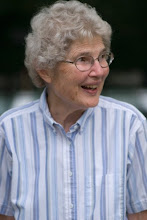Julius Goldenberg left Rumania around the turn of the century to dodge the draft. At least that's what I remember having heard once...it was his son Leonard who told me, in 2001, that Julius had been a Goldenberg until he lost two letters on Ellis Island. My father, I believe, told me the draft story, but it may have been my grandfather, whose voice I still hear on nights like this one when I can't fall asleep. In either case, the story seems plausible. The 1890s were for the east Balkans what the 1990s were for the West: a decade of pointless and forgettable wars. My great-grandfather Julius would have been especially justified in skipping service in them because serving in the military was effectively the only civil rights that Jews had not been stripped of at that particular point in Rumanian history.
I found a record in a ship's manifest that may be his--it's the only one in the Ellis Island archive for a young Julius Goldberg during that period in any case. That record has him coming from Jassy, a city now called Iasi and pronounced Yash. A big city that used to be half-Jewish, that gave birth to the world's first Yiddish newspaper and possibly also the world's first Yiddish theatre performance--both before my great-grandfather would have left--and was the site of a weeklong pogrom during the Second World War which Axis powers didn't even bother to hide from the news.
I have it on Grandpa Art's cousin Edith's authority that Julius' (2nd?) wife, Anna Spegel (Spiegel?), my great-grandmother, had come with her family from Rimnicu-Sarat, a small village which I later learned was also half-Jewish. They married in St. Paul, Minnesota on the 9th of Sivan in the year 5680, which was also the 25th of May, 1920. Their certificate of marriage hangs on my wall, written primarily in a language I can neither speak nor read, though with a little English inserted at the bottom.
The second human consequence of that old worn piece of paper, a son they named Arthur Avrum Goldberg, married Grandma Judy (long before she became Grandma Judy) in 1956--what the Jewish year was, I don't know. Her father was a Westwood and her mother a Holladay. Her aunt had been at Pearl Harbor when it was attacked to bring the U.S. into one conflict, and would later be in Kuwait when it was invaded to bring the U.S. into another. Doc Holladay, who probably started the gunfight at the OK Corral by cocking both barrels of his formidable weapon, is supposedly some sort of great-great uncle. John Pemberton, famous for coming up with the recipe for Coca-Cola and selling it for next to nothing, is connected to the Holladay family in some way, too.
My maternal grandparents' marriage was illegal. At least by the spirit of the law, if such a dead law can have a spirit. The letter of the law prohibited a Hindu from marrying a White, the term "Hindu" being a pre-Independence way of referring to all South Asians. Less than 5% of the South Asians in the United States at the time were Hindus, I once read--some 90% were Sikh like my grandfather and 5% Muslim--but to expect a racist legislature to sort out such distinctions is unrealistic. As for my grandmother, she was in the United States primarily as a result of unrest that had never quite ended after stemming from a Revolution named after 1910, more than twenty years before she was born. "Mexico for the Mexicans" was a slogan that had been used against her Mexican-born parents often enough that they took the precaution of crossing the border to the north for each child's birth long before they fled permentantly in that direction, leaving cousins, homes, and memories behind.
While my grandparents waited to find out where they could appeal the clerk's decision not to grant them a marriage license on the basis of this law, a fourteen-year-old girl came in and was granted a license with no more trouble than having her mother's signature taken down. (This was some 600 miles from where I now live, some 17 years after the most famous of Iasi's pogroms, 9 years before the Supreme Court case Loving vs. Virginia would overturn all state laws banning interracial marriage, and 42 years before Alabama would become the last state to officially remove these now-unenforcable laws from its books, but only 23 years before my sister, the first Caucajewmexdian I've ever known, would be born.)
Reading at Writ & Vision Thursday
-
I'm going to be doing a reading at Writ & Vision in downtown Provo at 7 pm
this Thursday.
I'm excited: I love to read my work, but I don't actually do so v...
6 years ago

at some point you should probably explain how all 4 of our grandparents ended up at the same university at the same time.
ReplyDelete